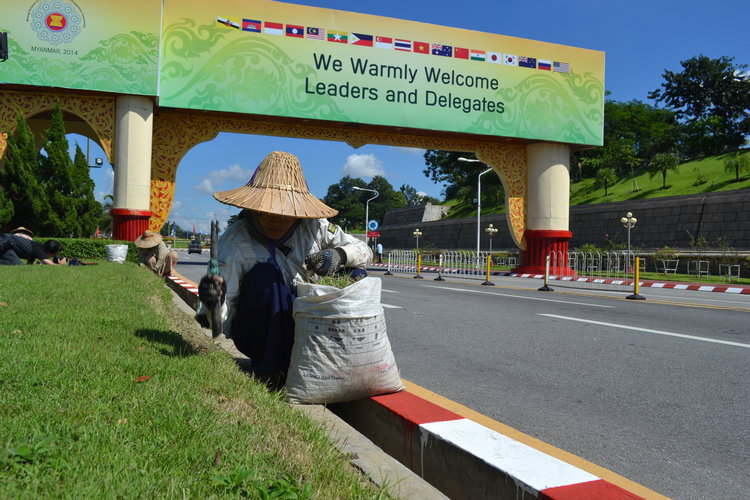Southeast Asian heads of state and prominent world leaders have begun gathering in the Burmese capital, Naypyidaw, for the 25th Summit of the Association of Southeast Asian Nations (ASEAN) and the East Asia Summit, held concurrently on 12-13 November.
The summit is Burma’s swan song as chair of the economic bloc, marking a year of conferences that have largely focused on the South China Sea islands dispute and preparations for launching the ASEAN Economic Community (AEC) in 2015, an initiative that is intended to greatly deepen regional economic integration.
One of the first to arrive on Tuesday was India’s Prime Minister Narendra Modi, who was given a guard of honour before being hosted for bilateral talks at the presidential palace by Burma’s President, Thein Sein.
“We had extensive discussions covering various aspects of our bilateral relations,” Modi told Indian media. “We talked about strengthening ties in the fields of culture, commerce and enhancing connectivity.”
Vietnam’s Prime Minister Nguyen Tan Dung was next to arrive to a red carpet welcome. Vietnam is one of four ASEAN member states – along with Malaysia, the Philippines and Brunei — that is involved in an ongoing territorial dispute with China and Taiwan over the Paracel and Spratly island groups in the South China Sea.
The issue has strained relations between ASEAN states in recent years, and almost led to an embarrassing breakdown of a summit in Cambodia in 2012.
The 24th ASEAN Summit, held in Naypyidaw in May, was almost derailed by acrimony over Beijing’s claims of sovereignty over the islands. Only a week ahead of the conference, China positioned an oil rig in an area also claimed by Vietnam, with Hanoi and Beijing accusing the other of provocations towards the other’s ships in the region close to the disputed Paracel Islands.
[related]
Following the May summit, Southeast Asian heads of state released a statement saying they are working to establish a Code of Conduct for the South China Sea. Without mentioning the ongoing naval confrontations between China and both the Philippines and Vietnam, the bloc said it will “work towards an early conclusion of the Code of Conduct in the South China Sea,” calling on all parties to “exercise self-restraint and non-use of force.”
Arriving on Wednesday is a who’s who of heads of state from around the globe. Australia’s Prime Minister, Tony Abbot, arrives in the Burmese capital at 10:30am, while Russia’s Dmitry Medvedev touches down half an hour later. Shinzo Abe, the Japanese Prime Minister, will arrive shortly before South Korean President Park Geun-Hye. Chinese Premier Li Keqiang is due in the early evening ahead of US President Barack Obama and his entourage.
With many high-profile dignitaries in town, some 40,000 security personnel, including 10,000 police officers, have been positioned at the airport, at summit venues and in other areas of the city.
Burmese military intelligence officer Khin Maung Tun said both police and military officers were being deployed to ensure safety.
“Security measures have been taken both inside and outside security lines, including police and soldiers,” he told Reuters.
Ubiquitous police roadblocks have been set up around Naypyidaw, and several routes have been sealed off as alerts circulated that police were on the lookout for four wanted members of the Rohingya Solidarity Organisation (RSO).
Officials claim the alleged insurgents may pose a threat to the city, but security experts say that there is no evidence to support such claims as there have not been any attacks by the RSO in over a decade.
Noting the significance of Burma’s chairmanship ahead of the launch of the AEC next year, the bloc’s Secretary-General Le Luong Minh said, “Myanmar has played an important role in accelerating the implementation of the remaining action lines” for the Southeast Asian single market. He added: “Myanmar’s chairmanship has also set the stage for the ASEAN Community’s post-2015 vision.”
The AEC, which is set to come into effect on January 1, 2015, envisions the creation of an ASEAN-wide common market. However the deadline has been met with widespread skepticism, as deep non-tariff barriers to trade prevail across the ten-country bloc. Some provisions, such as a measure to recognise professional accreditations region-wide and improve skilled labour mobility, will be enacted before more controversial measures that will threaten protected industries across the region.
The two-day summit will conclude on Thursday evening following a ceremony that will hand the ASEAN chair to Malaysia for 2015.
ASEAN, was established on 8 August 1967 in Bangkok, Thailand, with the signing of the ASEAN Declaration, or Bangkok Declaration, by the “founding fathers” of the bloc, namely Indonesia, Malaysia, Philippines, Singapore and Thailand. Brunei Darussalam joined in 1984, Vietnam in 1995, Laos and Burma in 1997, and finally Cambodia in 1999.



